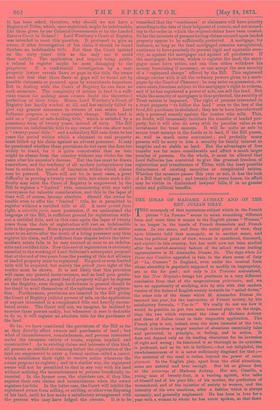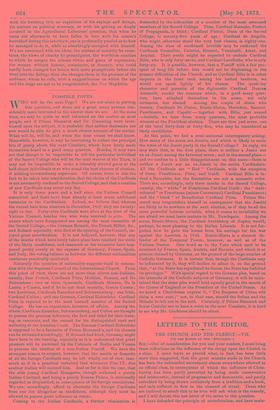THE IDEAS OF MADAME AUBRAY AND OF THE REV. JULIAN
GRAY. -
THE monopoly of that mysterious subject which in the French phrase "La Femme" seems to mean something different from and more than it means in the English phrase "Woman," is no longer in the hands of French dramatists and French actors. In one sense, and from the social point of view, they have hitherto held that monopoly, as in another sense, and from the political point of view, woman is considered, discussed, and exploiti in this country, but has until now not been studied after the morbid-anatomy fashion of the school whose leading representative is M. Alexandre Dumas fi/s. The days when La Dame aux Camelias appealed in vain to the stern sense of duty of "La Censure" in England, even under the musical form whose absurdity is popularly supposed to modify its impropriety, are in the far past ; not only is La Traviata naturalised, but the New Magdalen brings her penitence to a very different conclusion from that of the magnanimous poitrinaire, and we have an opportunity of studying, side by side with this modern version of the duties of English society towards its "soiled doves," the other side of the thesis which M. Alexandre Dumas fils resumed last year, for the instruction of French society, by the satisfactory formula, " Tue-la I" We really do not see how it would be possible to put two more immoral plays on the stage, than the two which represent the ideas of Madame Aubray and those of Julian Gray in their respective application. The French play is not, indeed, even the more immoral of the two, though it involves a larger number of situations essentially false and perverted, in principle, in feeling, and in action. It does not depend only on its leading characters for its inversion of right and wrong ; its falsehood is as thorough as its cynicism is profound, and as its wit is brilliant,—but not delightful, the unwholesomeness of it is never sufficiently disguised for that ;- the material of the meal is rotten beyond the power of sauce piquante. In the English play, apart from the chief situations, some are natural and true enough. But let us glance first at the entourage of Madame Aubray. Her son, Camille, a young man of twenty-four, is a ranting egotist, who talks of himself and of his pure life ; of his mother, the perfection of womanhood, and of the injustice of society to women, and the intensity of his own emotions, after a fashion which is always unmanly, and generally unpleasant. He has been in love for a year with a woman to whom he has never spoken, so that there
is no pretence of mind, or taste, or sympathy in the matter, and when, in the working-out of the play, his mother, whose " ideas " have formed him, has to tell him that this woman is the unmarried mother of the child of a man whom she never loved,—the woman (Jeannine) having told her the story of her life with perfect candour,—he receives the information without the least feeling that it ought to make him less desirous to marry Jeannine, but with a keen sense of his mother's incon- sistency in objecting. This is the result of a life of purity, and of the teaching of the best of mothers. But this is simple, in comparison with the falseness of the climax. Madame Aubray has an extreme horror of falsehood, but she has ideas of what it is that constitutes truth which are about as edifying as her son's ideas of purity. Jeannine, touched by Madame Aubray's kindness after she has told her the story of her life, resolves to disenchant Camille, in order to make his obedience to his mother's wishes less difficult, and so she proclaims herself a worse sinner than they know her to be. "La faute qua vous me pardonnez," she says, " parceque vous la croyez unique
dans ma vie, n'est pas la seule que j'aie commise A cote de cette faute, qui a tine excuse clans la misere, ii y en a d'autres qui n'ont pour cause que la fantaisie et la desordre. Certaines femmes en arrivent k ne plus rougir des faits, et a ne plus se souvenir des noms. J'ai ete une de ces femmes. Je vous Pavoue et, je vous quitte." Then Madame Aubrey, "unable (so runs the stage direction) to restrain the cry of her conscience," exclaims, " Elle ment!" and turning to her son, commands him, " Epouse-la!" She clasps the magnanimous Jeannine in her arms, a woman whom, in the preceding act, she had found profoundly unconscious of crime and totally unmoved by remorse, and thus explains the movement, " Me fake complice du mensonge, mettle pour sauver mon file! Etait ce possible ? Quel chatiment dss mes hesitations Dieu m'a inflige Vous etas ma fille !" It is hardly necessary to observe that Jeannine has previously offered to get them all out of their difficulties by committing suicide. Then there is M. Rabantin, Madame Aubray's confidant, a most amusing personage, who tells M. Valmoreau, also an amusing personage, and Camille's friend, that his wife is dead, whereas she is not, but is only living with a lover, of whom she is tired ; and there is his daughter, Lucienne, brought up by Madame Aubrey, and designed for Camille's future, an ingenue with a bullfinch in a bird-cage, whose complete unconsciousness and want of knowledge of life is made the occasion of the most unpleasant wit, and who comes in when Madame Aubray releases Jeannine from her maternal embrace, and assures her that she too will love her. And the young men talk, Valmoreau his lively libertinism, and Camille his egotistical philanthropy, to the old man, who talks to them his profound cynicism and spirituel good-sense ; while he makes Valmoreau pay a tax on his profligacies to a bonne ceuvre. Madame Aubray pro- poses to Valmoreau to realise one of her ideas by marrying Jeannine, because an habitual seducer of women cannot do better, by way of reformation, than restore to her place in society a woman whose " protector " has put it out of his power to marry her by marrying some one else! This "restoration to a place in society" is, it seems, the justice due to the daughter of poor parents of the ouvrier class, who simply regarded her con- dition of femme entretenue as a "position." In explaining her story to Madame Aubrey, Jeannine had said she was "recon- naissant" to M. Tellier, who provided for her and her child like an "lionne'te komme." Such are the ideas of Madame Aubrey, who, according to the author's dedication of the play, signifies, "Faith, Devotion, and Sacrifice." It would be only amazing and ludicrous, but that it is also sad and revolting. There is really nothing to choose between the " Tue-la !" of L'Homme-Femme, and the " Epouse-la!" of Les hides de Madame Aubray.
The motive of the New Magdalen is identical. "The day of punishment and vengeance is over, the day of pardon has come !" says the French lady, who supplies the text on which the sermons of Mr. Julian Gray are preached in the English play. We do not intend to imply that Mr. Wilkie Collins has taken either his story or its treatment from M. Alexandre Dumas. There are certain resemblances in detail, but they are unimportant ; the momentous resemblance is in the inversion of truth and falsehood, and of right and wrong, and in the imputation of a grand class of virtues— truth, courage, highmindedness, nobility of soul—to a person with whose actions such qualities are incompatible. It is a dangerously false picture also, because the woman whom the New Magdalen chiefly wrongs is made singularly unattractive ; and the man who is the victim, not of the first deception only, but of a long train of deceptions, is denounced by Mr. Julian Gray, the contributor of "ideas," in this instance because he does not discover each sub- limity in the telling of the truth in a single instance as would induce him to marry a fallen woman, who is also a thief and an impostor, and whose sudden conversion is, much more evidently than the author supposes, the mingled result of imminent detection and the personal influence of Mr. Julian Gray. The ostensible purpose of both these plays is to plead for the pitying pardon of society for the "outcast," driven to a life of sin by the hard conditions of the world, which render hopeless poverty, with its degradation and its suffering, the only birthright of so many women. To such a purpose we have nothing to accord but praise ; that sinners of this class may and do repent, and deserve rehabilitation, we thankfully believe, but we protest against their degradation being invested with poetic and heroic attributes, and their rehabilitation being turned into glorification. When Jeannine is clasped in Madame Aubray's arms, it is promotion, not restoration, that befalls her ; and when Mercy Merrick laments in the tent, just before she robs a supposed corpse, and plena an infamous conspiracy, that she "can't get back," she can hardly be contemplating in retrospect the life of Mablethorpe House, or the social position of a clergyman's wife. This is even more apparent in the dramatic than in the narrative version of the New Magdalen, because in the latter the author explains at length how Mercy Merrick fell step by step,. until she was received into the Refuge, out of the streets ; but in the play, the shock comes all at once, and with it the absurdity of a person whose real sphere of respectability, the sphere she has a right to covet and to regret, is that of a domestic servant—she tells how she lost her places, through the taint of the Refuge '—contemplating the assumption of the character of the adopted daughter of a lady of rank, as a balancing of the account between herself and society. To gratify her longing for home, friends, name, position—there is not one word about lost innocence or an offended God in all the protest of the " outcast "—this woman, on whom the author con- fers magnificent qualities and great beauty, deliberately becomes a thief, an impostor, and a liar on a tremendous scale. She cheats everyone, and she actually engages herself to marry a gentleman of such old descent that he presents her with a pearl necklace which has been in his family for four centuries, and also of inde- pendent fortune, though he is a Special Correspondent. But then,. Horace Holmcroft is a Special Correspondent only because Mr. Wilkie Collins wants him to meet Mercy Merrick on the war fields, and to provoke Lady Janet Roy's caustic observations about the Press, which are very amusing indeed. Mercy Merrick loves Horace Holmcroft, she tells the audience, and she is not altogether happy and comfortable in her usurped place, even before she is confronted,—by the unlucky philanthropy of the Rev. Julian Gray,—with the real Grace Roseberry, who has been restored to life by a German surgeon—in a singularly unpleasant scene- -and who has, very naturally, no friendly feelings to wards- the "woman from the refuge" who has robbed and personated her. But if there had been one spark of good in this woman, one lingering trace of decency, one faint suggestion of honesty, would she have ever contemplated marrying any man, at all events under a false character ? She is made interesting, and called noble, through a series of iniquities ; and when she tells the truth to Horace Holmcroft, who is quite reasonably jealous of Julian Gray, so clearly in the confidence of his betrothed, while he is so mysteriously excluded, she is lauded in terms which might befit the grandest act of martyrdom, and the curtain falls upon her, locked in the arms of the Rev. Julian Gray, who, hailing her as a purified soul, exhorts her to look upward to the angels, declares that she has taken her place among the noblest of human beings, and that the world, which he is reasonably prepared to find not on his side in this matter, could give him nothing so precious as she is ! This is indeed "repentance in a coach-and-six," and this fine climax is reached within a few minutes after the explanation between Horace Holmcroft and Mercy Merrick as betrothed lovers, within a week of their wedding, and in the interim Lady Janet Roy has declared that she has bestowed upon the " outcast " (in her capacity of swindler and impostor) a mother's love, which she cannot recall, for what is there a mother cannot forgive! If these be the debts of reparation which society owes to persons of the Mercy Merrick class, we earnestly hope society will continue to repudiate them, and will not be induced by such tawdry fallacies to substitute a premium for a penalty, only because the penalty is so often shamefully disproportionate to the sin. Julian Gray is as unlike a conventional clergyman as Mr. Wilkie Collins could wish him to be, but then he is equally unlike a gentleman. We are not, however, concerned with his manners,— with his sitting down unbidden, in the presence of a stranger lady, to eat and drink, and talk about what he is eating and drinking ;
with his bursting into an exposition of his sayings and doings, his notions on political economy, or with his getting so deeply involved in the Agricultural Labourers' question, that when he turns out afterwards to have fallen in love with his cousin's betrothed during this interview, one is profoundly puzzled as to how he managed to do it, while so absorbingly occupied with himself. We are concerned with his ideas, the notions of morality he enter- tains, the views of charity he promulgates, the worthless emotion to which he assigns the solemn virtue and grace of repentance, the woman without honour, conscience, or decency, who could hardly have changed her lovers with more promptitude before she went into the Refuge than she changes them in the presence of the audience, whom he calls, with a suggestiveness on which the age and the stage are not to be congratulated, the New Magdalen.




































 Previous page
Previous page